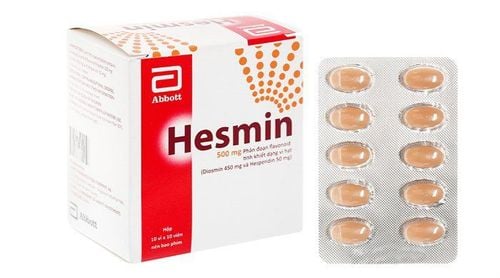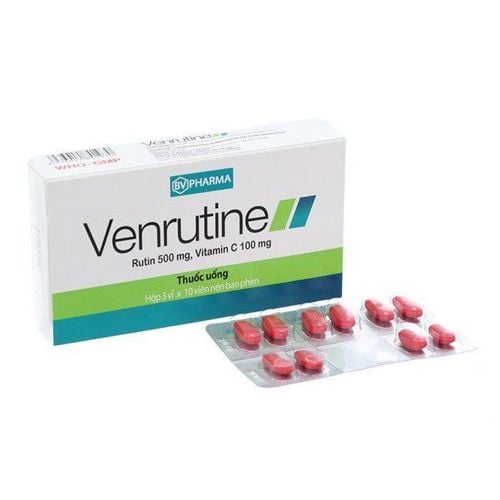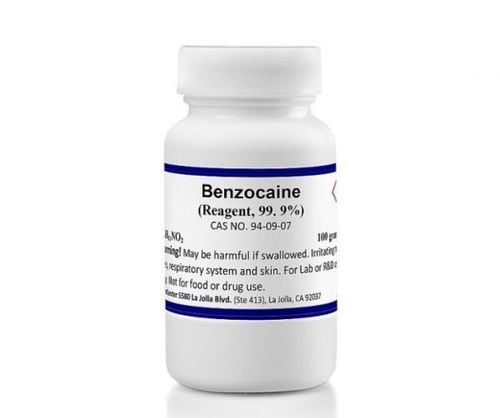This is an automatically translated article.
Cortenema is a prescription medication used for colon enema to treat itching or swelling of the rectal area caused by hemorrhoids or other conditions or inflammation of the rectum or anus. To ensure the effectiveness of using Cortenema, patients also need to follow the instructions of a specialist, and refer to more information about the uses of Cortenema in the article below.1. What is the use of Cortenema?
1.1. What is Cortenema? Cortenema belongs to the group of gastrointestinal drugs, is a proprietary product of ANI Pharmaceuticals, Inc.
The drug includes the following ingredients:
Main active ingredient: Hydrocortisone 100mg Excipients: Allyl pentaerythritol or Allyl sucrose crosslinked, polysorbate 80, purified water, sodium hydroxide, methylparaben. Cortenema is available in a 60ml bottle as a single-dose enema solution and is recommended for use in adults.
1.2. What does Cortenema do? Hydrocortisone active ingredient with strong anti-inflammatory effect, absorbed through the colon and exerts local and systemic effects. Absorption of the drug into the body is up to 50%.
Cortenema is essentially a steroid like cortisol, a natural hormone your body makes. Works to reduce certain chemicals in the body that cause swelling and pain in the lower intestine used as an adjunct in the treatment of ulcerative colitis, especially the distal forms, including prostatitis , proctosigmoid ulcerative colitis and left-sided ulcerative colitis.
Contraindications:
Patients who are allergic to the main active ingredient hydrocortisone or excipients of the drug. Systemic fungal infections (other than skin or nails). Peritonitis (inflammation of the lining of the stomach). Intestinal obstruction, fistula, or a tear in the wall of your stomach or intestines.
2. How to use the drug Cortenema
2.1. How to use the drug Cortenema The drug Cortenema is used rectally, not by other routes. The best time to take Cortenema is before going to bed. Use exactly as directed by your doctor. Do not use in larger, smaller doses or for longer than recommended. Follow the directions on your medicine label exactly. Steps to take:
Try to empty your bowels and bladder just before using Cortenema rectal. The medicine will work best if your intestines don't have too much food. Wash your hands. Shake the bottle of Cortenema well to make sure the medicine is mixed well. Remove the protective cap from the applicator bottle tip. Be careful that the medicine inside does not leak out. Lie on left side, left leg extended, right leg bent towards chest for balance. You can also adopt a kneeling position. Maybe asking someone else to help will pump the medicine better. Gently insert the applicator tip into the rectum through the anal opening, bringing the tip of the bottle toward your navel. Hold the bottle steady. Squeeze slowly and steadily to push the medicine into the rectum. Withdraw tools. Try to stay in the same position for at least 30 minutes so that the fluid will distribute throughout the left colon. Avoid going to the toilet while taking the medicine. If possible keep the medication inside your body throughout the night (while you sleep). Discard the medicine bottle. Wash hands thoroughly. Each bottle contains only one dose and must not be reused even if there is still medicine left in the bottle. Use only the applicator provided with the Cortenema bottle to insert the medicine into your rectum. 2.2. Dosage of Cortenema The recommended dose is once daily and nightly for 21 days, or until the patient is clinically and therapeutically in remission. The clinical symptoms of the disease usually subside rapidly within 3 to 5 days. The improvement in mucosal surface, as seen by sigmoidoscopy, may be slightly later than the clinical improvement. Severe cases may require treatment with Cortenema for up to 2 or 3 months. Where treatment lasts longer than 21 days, Cortenema should be discontinued gradually by reducing the frequency of dosing every night for about 2 or 3 weeks before stopping completely. If there is no clinical improvement within 2 or 3 weeks of starting Cortenema, discontinue use and reevaluate. Treatment when missed dose:
The drug is only used once a day and is usually used at night, so use it as soon as you remember it. Do not take more than 1 dose a day. Treatment of Overdose:
An overdose of rectal hydrocortisone is not usually expected to cause life-threatening symptoms. However, long-term use of high doses of steroids can lead to symptoms such as thinning skin, easy bruising, changes in the shape or location of body fat (especially in the face, neck, waist, back). , facial hair, increased acne or menstrual problems, impotence or loss of interest in sex.
3. Notes when using Cortenema
Avoid vaccination during treatment with Cortenema enema. Vaccines may not work as well while you are taking steroids. Children using Cortenema rectal may have an increased risk of side effects including growth retardation and delayed weight gain. Talk to your child's doctor about the risks of using this medicine. Using Cortenema can cause you: Damage to the rectal wall: Improper use of Cortenema can damage your rectum. Make sure you understand how to properly use Cortenema. Higher risk of infection: Cortenema can weaken your immune system, by it can mask some signs of infection and also increase your risk of getting an infection. If you have symptoms of an infection, including fever, fatigue, chills, cough, shortness of breath, or congestion, contact your provider immediately. Vision problems: Long-term use of Cortenema can cause problems with your eyes, such as cataracts, glaucoma, damage to the nerves in the eye, and eye infections. . Corticosteroids should be used with caution in patients with ocular herpes simplex because of possible corneal perforation. Fluid retention and high blood pressure: Taking Cortenema in high doses can cause your body to retain more salt and water, which can lead to swelling in your legs or arms and sudden weight gain that can raise your blood pressure. You need to eat a low-salt diet while taking Cortenema to reduce your risk of high blood pressure. Inform your treating doctor if you have the following conditions: Heartworm infection. Diabetes; diverticulitis (inflamed bulge in the lining of the large intestine). Heart failure; High Blood Pressure; a recent heart attack. Osteoporosis. myasthenia gravis. Emotional abnormalities, depression, or some other type of mental illness. Tuberculosis. Cirrhosis; kidney, liver, or thyroid disease. Using hydrocortisone rectal may decrease your body's ability to fight infection and may prevent the development of symptoms if you have an infection. Stay away from people who are sick (especially chickenpox or measles) and wash your hands often while you are using this medicine. Psychiatric disturbances that may occur with the use of corticosteroids (including Cortenema), range from insomnia, euphoria, mood swings, personality changes, and major depression, to frank psychotic manifestations . In addition, emotional instability or predisposition to psychosis may be aggravated by corticosteroids.
4. Side effects of the drug Cortenema
Fluid and electrolyte disturbances: Sodium retention; water retention; hypokalemic alkalosis; hypertension, congestive heart failure in susceptible patients; loss of potassium. Musculoskeletal: Muscle weakness; steroid myopathy; loss of muscle mass; Osteoporosis; spinal compression fractures; aseptic necrosis of the femoral head and femur; long bone fracture. Gastrointestinal: Peptic ulcer with possible perforation and bleeding; pancreatitis; distention; esophagitis. Dermatology: delicate skin; petechiae and red spots; impaired wound healing; increased sweating; facial erythema; may not react to skin tests. Nervous: Convulsions; dizzy; headache; increased intracranial pressure with papilledema (pseudogout) usually after treatment. Endocrine: Irregular menstruation in women; the development of the Cushingoid state ; secondary adrenocortical and pituitary unresponsiveness, especially during times of stress, such as in trauma, surgery or illness, reduced carbohydrate tolerance; growth inhibition in pediatric patients; Manifestations of latent diabetes require insulin or oral hypoglycemic agents in diabetics. Ophthalmology: Subcapsular cataract; glaucoma ; glaucoma; exophthalmos. Metabolism: Negative nitrogen balance of protein catabolism. Contact your doctor right away if you have a serious side effect such as:
Feeling short of breath, even with mild exertion; Swelling of your ankles or feet; Muscle weakness; Rapid weight gain, especially in the face and abdomen; Severe rectal pain or burning sensation; Rectal bleeding; Severe stomach pain; severe or sudden headache, painful feeling behind your eyes; Convulsions.
5. Cortenema drug interactions
Drugs and drug groups that interact with Cortenema include:
Amphotericin B (Abelcet, Ambisome, Fungizone); Typical anticoagulants such as warfarin (Coumadin, Jantoven); Aspirin or other NSAIDs such as ibuprofen (Motrin, Advil) and naproxen (Naproxen, Aleve); Sedative; carbamazepine (Epitol, Tegretol, Carbatrol, others); Cyclosporine (Gengraf, Neoral, Sandimmune); Digoxin (Lanoxin); Hormonal contraceptives (patches, rings, implants, oral contraceptives and injections); Isoniazid (in Rifamate, in Rifater); Ketoconazole (Extina, Nizoral, Xolegel); macrolide antibiotics such as clarithromycin (Prevacid, Biaxin) or erythromycin (Eryped, EES, Eryc, others); Medicines for diabetes; phenytoin (Dilantin, Phenytoin); and rifampin (Rifadin, Rimactane, in Rifamate, in Rifater). To ensure safety when using and limit drug interactions, it is necessary to inform the doctor prescribing the drugs that you are taking.
6. How to store Cortenema
The shelf life of Cortenema is 36 months from the date of manufacture. The drug storage temperature is from 20 to 25 degrees Celsius. Store the medicine in the original packaging, avoid direct light, avoid moisture, avoid heat sources that can change the medicine. Keep out of reach of children. The article has provided information about what Cortenema is, dosage and precautions for use. Because Cortenema is a prescription drug, patients should not use it on their own, but need to contact a doctor or professional person directly to get an appropriate prescription to ensure safety for health.













